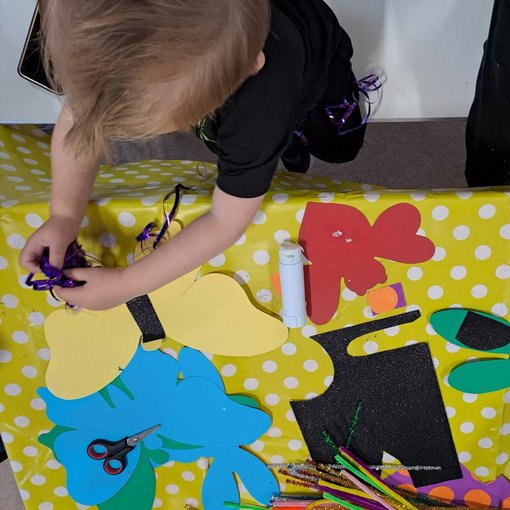Working with museum partners early-years professionals to develop and enhance the programme for caregivers and children

Mini Wonders is jointly created and funded by Art Fund, through a generous legacy grant from the Foyle Foundation, and Nesta.
Mini Wonders is an early-years, museum-sector innovation programme led by Nesta and Art Fund along with 15 museums exploring a new, engaging and scalable way to support caregivers and their children aged 2-4. The project's goal is to unlock the social value of museums for more families, and support child development in the early years.
The innovation potential of Mini Wonders lies in the power of museum spaces, collections, and expert creative staff to provide space for intergenerational learning, social connection and quality time. The programme fuses fun, inspiring and welcoming family experiences with well-evidenced parenting strategies drawn from established programmes. Our ultimate ambition, together with Art Fund, is to create a robust, evidence-informed model that has potential to be scaled to museums across the UK.
Mini Wonders is currently midway through its two-year research and development journey, with an eight-week programme being prototyped with museums around the UK. The programme aims to enable parents to build skills and confidence that best support their child’s social and emotional development, helping them to thrive at home, nursery, when starting school and beyond.
Developed in collaboration with early-years experts, parenting-intervention developers, and the museum sector, each of the weekly sessions covers a topic that encourages warm and responsive caregiving, including naming and expressing feelings, giving praise, and the importance of routines. Family-friendly creative activities, games and stories are paired with adventures through the museum and time for reflection, discussion and having a go at new ways of supporting social and emotional development.
Our evidence-driven approach means that we draw inspiration from evidence-based programmes. It also means that we aim to generate new evidence about whether and how Mini Wonders works, using this evidence to continuously refine the design of the programme and eventually generate rigorous qualitative and quantitative evidence about its potential impact.
To do this well, we have been working closely with museum partners, early-years professionals, families and children to gather insights and develop the programme. We have been testing, learning and refining as we go with families experiencing Mini Wonders firsthand. Eight lead museums have each run the Mini Wonders programme with three cohorts of families. We have been collecting insights and data throughout - via surveys and interviews with caregivers, community partners and facilitators, through peer-sharing sessions and research visits to the sessions. Collectively, we have been considering what is working well, what needs more thought or support, what is challenging across the board and where we want to focus next. We have also been developing a robust plan for evaluation as we begin to think about the essential elements that are needed to make a Mini Wonders experience enjoyable and useful for caregivers and children.
Feedback from families from interviews and surveys has been really positive, with caregivers reporting high levels of enjoyment and engagement for both themselves and their children. We have learnt that welcoming staff have made them feel comfortable and valued, and that creative activities and museum spaces have been enjoyed by parents and children alike. Families have enjoyed the social elements of the programme, as well as the structured approach to themes and activities - and the chance to have fun quality time together. In interviews, parents often mentioned how they were finding elements of the content useful at home - trying out or revisiting ideas like routine charts, talking about feelings and giving descriptive praise more often.
"This programme is like no other primarily because it gives space for parents to feel supported and heard. Not only you get to learn about how to be the best parent for your child you also learn how to stay in touch with yourself"
Caregiver
Research and reflection with the participating museums has also identified areas for future focus. We are working to find the best way to balance the importance of museums retaining their unique approaches to creativity and collections work, with the ambition to develop a core Mini Wonders experience for families across the UK. We are thinking about creative and practical ways to help caregivers think about and adopt new approaches to supporting social and emotional development at home, and how to further strengthen this in sessions. We are also exploring how museums can best reach and engage families through community partners, as families often face the same logistical and social barriers that affect early-years services more widely. Our early research indicates that once families come to Mini Wonders they generally keep coming back, which is a promising sign.
"I think speaking to parents about tips and strategies to support their child’s development is a lot easier when they're actually engaged in a creative activity themselves. It feels a lot less pressurised."
Participating museum
We are now at an exciting milestone, onboarding a further seven partner museums from around the UK to join the current museum cohort. This group of 15 institutions will run Mini Wonders with new groups of families, allowing us to learn how the programme works across a diverse range of communities. This second phase of research and development is crucial to gather insights about how Mini Wonders adapts to different contexts, to refine our approach to programme design and evaluation, and to continue to explore future scaling strategies.
Map of participating museums
Louise Bazalgette, Sarah Cattan, Deborah Fox, Anna Landreth Strong, Umesh (uMe) Pandya, Camille Stengel, Vivek Roy-Chowdhury, David Bleines, Simran Motiani, Max Blore, Giulia Tagliaferri